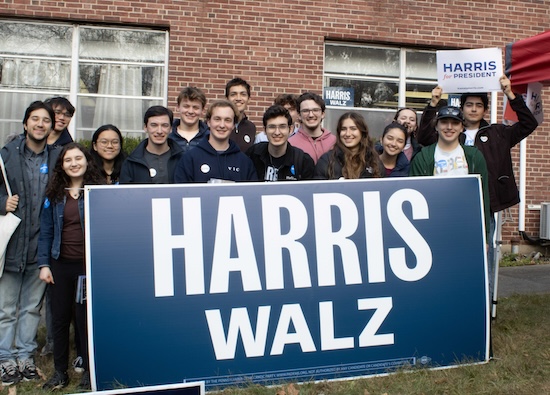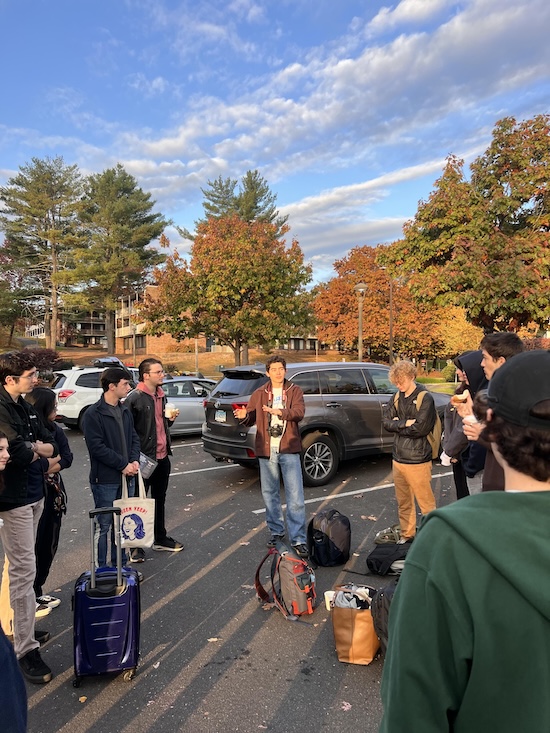
c/o Luca D’Agruma
As the presidential campaigns for Donald Trump and Kamala Harris draw to a close, Wesleyan students reflected on their canvassing trip to the Lehigh Valley in Northeastern Pennsylvania on Saturday, Oct. 26 and Sunday, Oct. 27. The trip, which was hosted by the campus group Wesleyan for Harris, brought 17 students to Bethlehem and Allentown to knock on doors and share student enthusiasm for Harris, as well as other Democratic candidates for the U.S. Senate and the House of Representatives.
“Focusing on Bethlehem and Allentown, our members knocked on 1,200+ doors on behalf of the Harris-Walz campaign and down-ballot Democrats such as Bob Casey and Susan Wild,” volunteer and Wesleyan for Harris organizer Luca D’Agruma ’27 wrote in a statement to The Argus.
The trip focused on courting registered Democratic and Independent voters in the Lehigh Valley region, an area which has remained purple in recent elections. Won by Barack Obama in 2008 and 2012, it flipped Republican in 2016 and helped Donald Trump win the state and the presidency. In 2020, Joe Biden won Northampton County by just 0.7 percentage points, according to NPR.
“It was clear this election was going to be close in Bethlehem and Allentown,” D’Agruma wrote. “The same weekend we were there, the campaign knocked on tens of thousands of houses in Bethlehem alone.”
Volunteers used the MiniVAN 9 program, an app designed to track canvassing routes, and to collect and display information on age, gender, voter registration, and previous political participation of people they contact. Canvassers spoke to voters on a variety of issues, from how to best access ballot boxes and in-person voting locations to sharing information on the policies of Democrats in the state running for U.S. Congress. Volunteers also carried brochures, referred to as campaign lit, or literature, on the Harris-Walz ticket and other down-ballot candidates.
“We talked with people who weren’t sure of their registration status and people who were undecided,” canvasser and Wesleyan for Harris organizer Saul Ferholt-Kahn ’27 wrote in a statement to The Argus. “We shared voting information with folks who didn’t know where their poll site was located and spoke with two older voters to arrange rides for them to go vote on Election Day.”
The canvassing effort reflected the shifting politics of Pennsylvania and the strategies implemented by both parties to court swing voters in small cities such as Bethlehem. According to data collected by AdImpact, Democratic campaigns have spent $637 million in Pennsylvania this year, compared to $290 million in 2020. Republicans have spent $543 million and $157 million in 2024 and 2020, respectively. In all, nearly a quarter of all advertisement spending by Democratic campaigns will go to Pennsylvania.

c/o Luca D’Agruma
Canvassing efforts in Bethlehem reflected this spending frenzy, but also genuine enthusiasm from volunteers from across the East Coast; Mercedes-Benz vans with uniformed drivers were seen ferrying volunteers from the canvassing offices to neighborhoods across the county just as lines of more canvassers waiting for assignments formed around the building. During the first day of canvassing, organizers nearly ran out of areas for people to canvass.
“As exciting as it was, there was almost a sense of disorganization, like too many people had shown up to canvass and the organizers didn’t know what to do,” volunteer canvasser Graham Johnson ’27 said.
These initial issues were remedied by the end of the day, and by Sunday morning the canvassing effort was more organized. After receiving region assignments at the offices, canvassers were split up into cars and were driven to canvassing areas. From there, the volunteers walked, in pairs or alone, knocking on up to 70 doors per region before returning to the offices.
After a busy two days out on the field, volunteers reflected on the stakes of the election and their personal experiences on the ground.
“You might assume that with just two weeks left to go in a fiercely competitive swing state, everyone has a plan to vote locked in, and they’re tired of all the politics,” Ferholt-Kahn wrote. “But even though we saw some mailboxes literally overflowing with political mail, plenty of people still hadn’t had a face-to-face conversation with a volunteer, or made a plan to vote.”
Many volunteers underscored the value of face-to-face conversations in the midst of one of the most competitive, and divisive, elections in recent history. Organizers from Wesleyan for Harris stressed that canvassers were there to listen to voters, not to read out policy memos.
“On Sunday afternoon, I was speaking to a Puerto Rican woman in Spanish about the election,” volunteer and Wesleyan for Harris organizer Melanie Glatter ’27 wrote in a statement to The Argus. “She was an undecided voter, so I tried to outline the horrific plans Project 2025 and Donald Trump have for women’s freedoms and immigration. At the end of our conversation, she thanked me for taking the time to talk to her about why I was voting for Kamala Harris, and it seemed like she walked away considering casting her ballot for Harris as well. It felt like a win.”
The trip to Pennsylvania offered volunteers from Wesleyan for Harris an opportunity to reflect on the state of grassroots politics and their future hopes for organizing.
“By fighting for our democracy through engaging in real conversations, we’re not just working to defeat Trump’s destructive far-right agenda and elect Democratic candidates — but we’re also trying to change how people relate to politics,” Ferholt-Kahn wrote.
Miles Craven can be reached at mcraven@wesleyan.edu.